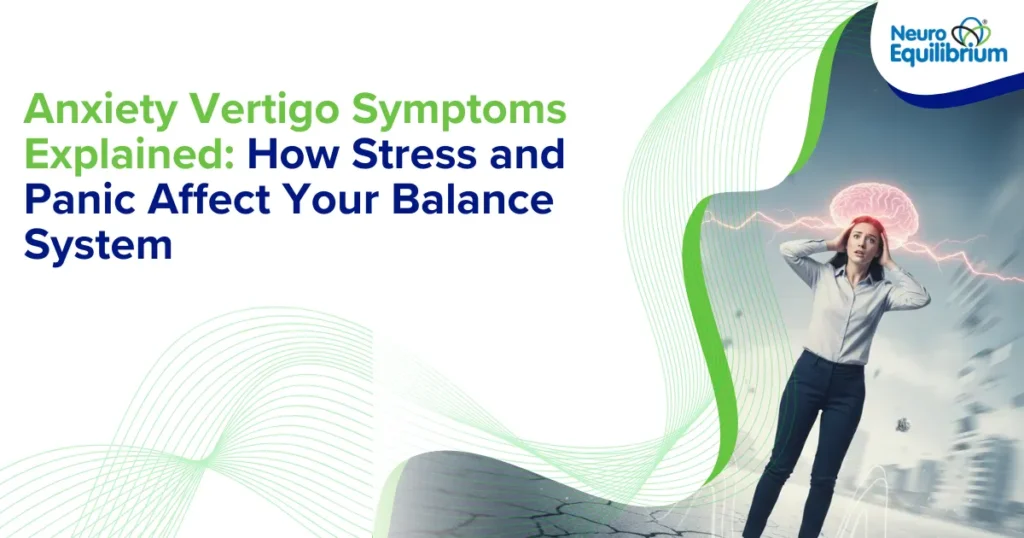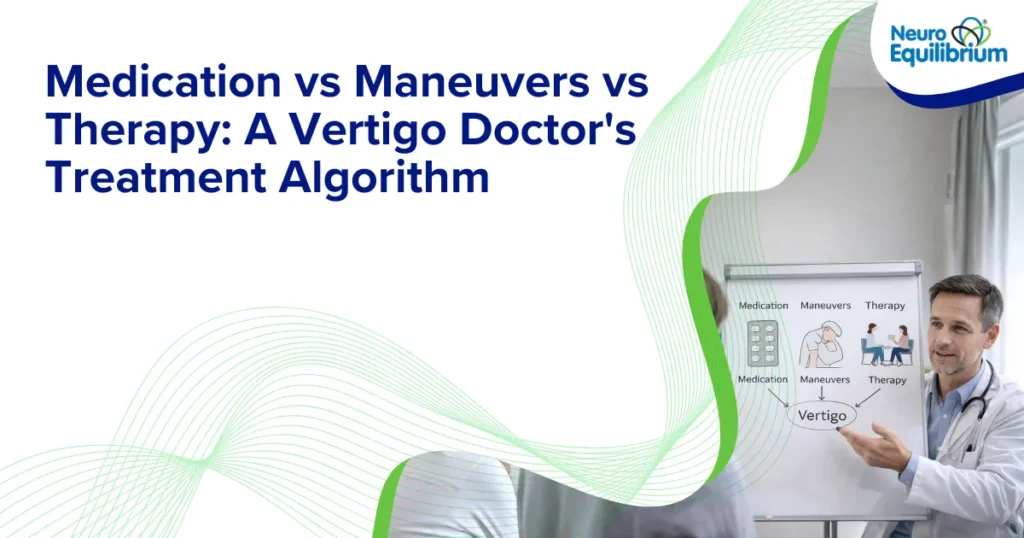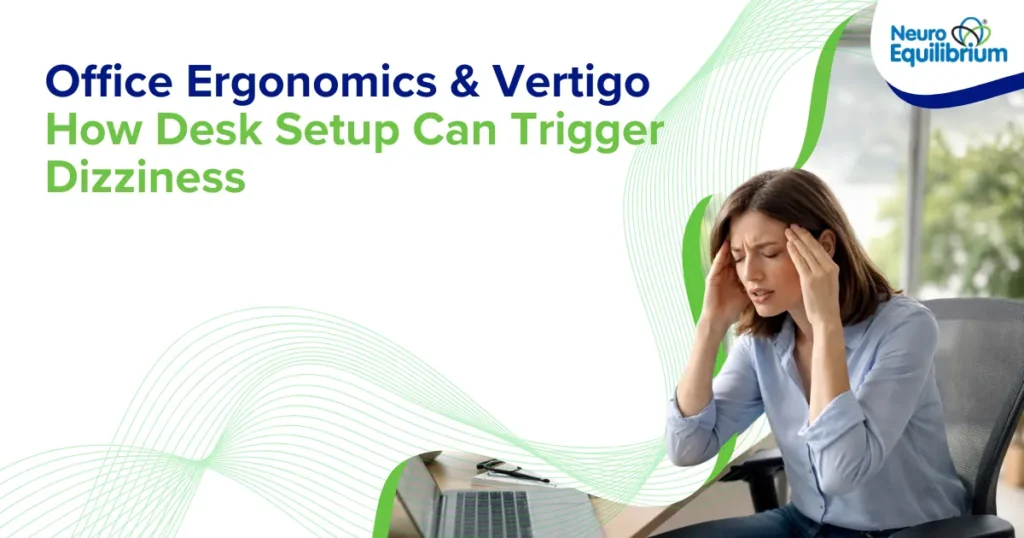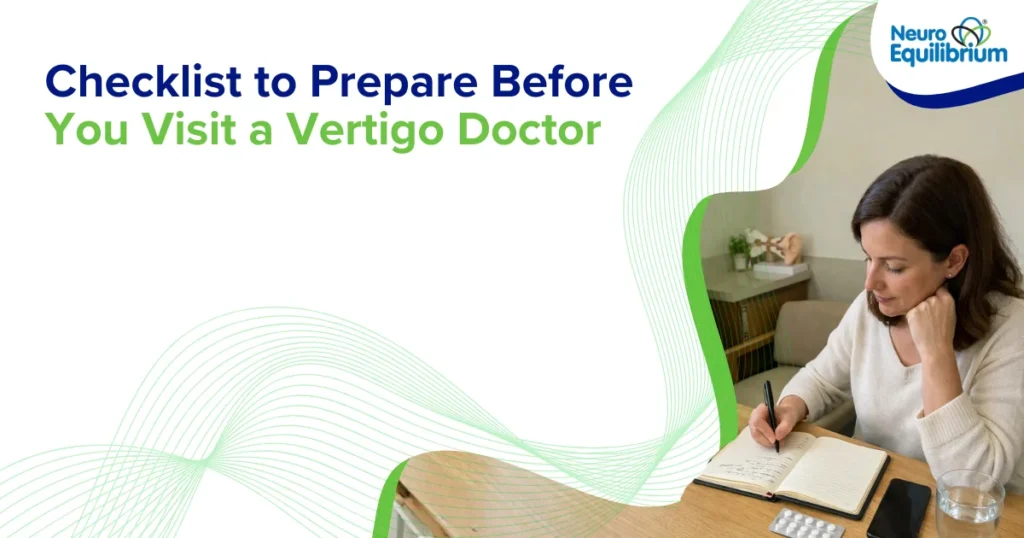Have you ever felt that the room is revolving around you without any cause or felt your body shake when you were not moving? You don’t know what to do. Such feelings are not exclusive to most of us and in fact, they occur more when one is experiencing stress, anxiety or emotional upheaval.
You are not alone, in case you would ever have been scared to go so fast because you were afraid that you might fall. Anxiety may have a very strong impact on the balance system and most individuals develop some sense of dizziness or a short time of vertigo when they are stressed or panicked. The doctors tend to discuss the fact that the body responds, and the mind has no time to comprehend what has occurred, and the balance system is rather fast to this alteration.
What is Anxiety Vertigo?
The sensation that causes you to feel that room is spinning despite nothing in the room moving, is vertigo. It can easily occur due to inner ear problems or the outer ear parts of the brain that make you balance.
These sensations may also be caused by anxiety. As stress, worry or panic accumulate, it may cause you to feel dizzy. When you already have vertigo, anxiety may intensify it. This is due to the fact that the balance system of the body and the system of stress reacting to it are interlinked. Your body gives mixed signals to the brain when you are under stress, which may give the impression of instability.
Understanding how stress and dizziness are linked is an important first step toward feeling steady and in control again.
Know More About Vertigo
- Do You Need a Vertigo Specialist?
- How Vertigo Is Diagnosed at NeuroEquilibrium
- Vertigo and Balance Disorders in Children
Symptoms: What Does Anxiety Vertigo Feel Like?
Here are some of the things people often report when anxiety and vertigo mix:
Physical & Balance Symptoms
- A feeling of the room spinning (classic vertigo)
- A rocking, swaying or wobbling sensation (more common when anxiety is involved)
- Light-headedness, slight dizziness, or feeling “off”
- Feeling unsteady while walking or standing
- Nausea sometimes, or a sense of motion sickness
Psychological & Behavioural Symptoms
- Loss of confidence when moving around or walking: you might avoid stairs, crowded places, or driving
- Fear of falling or injuring yourself
- Social avoidance: “I won’t go out because what if I get dizzy”
- Negative thoughts: “I’ll never get better,” or “This always happens to me”
- Hypervigilance: Being overly alert for any movement or trigger that might cause dizziness
So if you’ve noticed yourself thinking: “Every time I look around fast I feel dizzy, and I’m afraid to leave the house,” you might be experiencing anxiety vertigo symptoms.
Why Do Stress, Panic & Anxiety Mess With Your Balance?
You can imagine what happens to your body when you are stressed or anxious and how this can disrupt your balance system.
- Fight or flight kicks in: When anxious or panicking, it is the fight-or-flight response that kicks in. The heart rate increases, breathing rate increases, muscles become tighter.
- Neck, shoulder, head tension: This may interfere with the communication between your inner ear (which is the sense of movement and balance) and your brain.
- Breathing fast (hyperventilation): This may decrease the level of carbon dioxide in your blood. That makes one lightheaded and it can be very dizzying.
- Stress + Existing balance problem worse: In case you already have a vestibular disorder (inner-ear balance condition), the stress increases the dizziness or vertigo.
- The cycle of evil starts: The more you are dizzy the more you worry. The more worrying you are, the more you have muscle tension and upset breathing. And the dizziness worsens.
In other words: stress does not always result in vertigo in its own right but it compounds the problem and in some individuals it can be the trigger of a balance disorder. The research indicates that individuals with anxiety disorders are at high risk of some vertigo disorders.
Specific Balance Disorders Linked to Anxiety/Stress
Here’s a helpful little table summarising two common balance disorders where stress and anxiety play a big role:
| Balance Disorder | How It Shows Up | How Anxiety/Stress Links In |
| Vestibular Migraine (VM) | Dizziness or vertigo episodes, sometimes without a big headache; may include nausea, sensitivity to light/sound. | Stress is a common trigger for VM attacks. |
| Persistent Postural-Perceptual Dizziness (PPPD) | Long-term unsteadiness or rocking, worse when standing upright, moving, or in busy visual scenes. | Anxiety and PPPD amplify each other: anxiety worsens the dizziness, the dizziness increases anxiety. |

How to Know Whether the Dizziness Is from Anxiety or Something Else
It can be hard to tell if dizziness is caused by anxiety or by a physical balance problem. Anxiety-related dizziness often appears during stressful moments, emotional upset, or panic. It may come with symptoms like fast breathing, a tight chest, or a feeling of fear.
If the dizziness improves when you calm down or take slow breaths, it may be related to anxiety.
However, dizziness that happens with head movements, hearing changes, nausea, or sudden spinning may be caused by an inner ear condition. If you are unsure, a proper evaluation can help identify the exact cause.
The Stress and Vertigo Cycle Explained
Stress affects the body in many ways. When you feel anxious, your breathing becomes shallow, your muscles tighten, and your brain becomes more alert. These changes can confuse the balance system and make you feel dizzy or unsteady.
The dizziness then makes you worry more, and the added worry makes the dizziness feel even worse. This creates a cycle where stress increases dizziness, and dizziness increases stress. Understanding this cycle is the first step in breaking it.
When Anxiety Makes Existing Vertigo Worse
Many people with inner ear conditions notice that their vertigo becomes stronger when they are stressed or anxious. Stress makes the brain more sensitive to balance signals, so any small imbalance feels much bigger.
If you already have conditions like BPPV, vestibular migraine, or Meniere’s disease, anxiety can make the symptoms last longer or feel more intense. Learning how to manage stress can make a big difference in reducing the severity and frequency of vertigo episodes.
Practical Tips for Immediate Relief
Whenever the dizziness caused by anxiety suddenly sets in, there are some easy steps that we tend to recommend and make you feel better in the present moment. Begin with placing slow and deep breathing to relax your body. You need to sit down and make your eyes fixed on something stable in order to stabilize your balance system. Symptoms can also be calmed by drinking water, taking a light snack, or going somewhere less noisy. We also recommend that you go gradually rather than rushing and in the process, your body will have time to re-equilibrium. These are little activities that can result in a significant change of your mood at the time.
Long-Term Treatment Options
We have found that in order to provide a lasting solution to dizziness, one has to provide relief not only to the dizziness but also to the anxiety causing the dizziness. This can involve therapy to help control the causes of anxiety and therapy of vestibular rehabilitation to help build up your balance system. We can guide you on lifestyle behaviors like improved sleep, frequent meals, hydration and stress management. In other circumstances, we can prescribe medicines, when it is right in your case.
When to Seek Help and How Neuroequilibrium Can Support
If your dizziness continues, and starts to affect your normal routine of life, and if it becomes hard to control, then we urge you to contact us. Also it is quite natural to be confused as to whether you have anxiety-induced symptoms or a balance disorder or both. In case of any sensations of dizziness as well as hearing, vision, speech, or strength changes, one should seek medical care immediately.
At NeuroEquilibrium, we use advanced balance testing to understand exactly what is causing your dizziness. We look at both physical and emotional factors because the balance system and the stress response are closely connected. After understanding your results, we create a personalized treatment plan that may include vestibular rehabilitation exercises, lifestyle adjustments, and support for managing anxiety related triggers. Our aim is to help you feel steady, reassured, and confident as you move through your daily life. Book an Appointment today.
Conclusion
Getting dizzy, unbalanced, or experiencing anxiety vertigo does not need to be ignored. With the combination of stress and issues with balances you can get into a loop that may seem difficult to get out of, but with the right knowledge and help you may get out of that habit. You can feel in control again and be more confident by learning what is going on in your body, controlling the anxiety that drives the symptoms and obtaining professional help with your balance system.
Our team at NeuroEquilibrium assesses the precise cause of your dizziness, identifies the correct treatment plan to help you, with the help of high-quality testing and individual treatment plans. When you are inclined to think that you are feeling unsteady due to stress or that you are unsteady due to being anxious, then this is the appropriate moment to contact. We can help you to break that cycle and begin to feel stable, relaxed, and stable once more.
Sources
- Yetman D. (2020). Can Stress Cause Vertigo? Risk Factors, Treatment, and More. Healthline. https://www.healthline.com/health/can-stress-cause-vertigo (Healthline)
- Anxiety and Dizziness: What’s the Connection? Healthline. (2021) https://www.healthline.com/health/anxiety/anxiety-dizziness (Healthline)
- Anxiety and Dizziness — Why Does it Happen? Medical News Today. (2025) https://www.medicalnewstoday.com/articles/anxiety-and-dizziness (Medical News Today)
- Vertigo and Stress: Is There a Link? Medical News Today. (2024) https://www.medicalnewstoday.com/articles/can-stress-cause-vertigo (Medical News Today)
- Dizziness and Vertigo – Causes, Symptoms & Management. Better Health Channel. (Victoria, Australia) https://www.betterhealth.vic.gov.au/health/conditionsandtreatments/dizziness-and-vertigo (Better Health Channel)
- Morris L.O., PT, NCS. (2023). Dizziness Related to Anxiety and Stress. ANPT / Vestibular Special Interest Group. https://www.neuropt.org/docs/default-source/vestibular-sig/vsig-english-pt-fact-sheets/anxiety-and-stress-dizziness.pdf (Neuropt)
- Can Stress Cause Vertigo? Understanding the Connection. CounselingCenterGroup.com. (2024) https://counselingcentergroup.com/can-stress-cause-vertigo/ (The Counseling Center Group)
Why do I feel dizzy when I get anxious?
Because anxiety causes muscle tension, hyperventilation and nervous-system activation all of which disturb your body’s sense of balance and can make you feel dizzy or off-kilter.
Can anxiety cause vertigo?
Anxiety alone rarely causes true spinning vertigo, but it can trigger or worsen balance disorders which then cause true vertigo. Also, anxiety can cause a rocking or light-headed sensation which people describe as “vertigo”.
How does anxiety vertigo differ from normal vertigo?
Normal vertigo often is due to a physical problem in the ear/brain and the main symptom is spinning. Anxiety-related vertigo tends to include unsteadiness, rocking, wobbliness, light-headedness and is heightened by stress/visual stimuli.
What can I do right when an anxiety-triggered dizziness spell hits?
Stop moving fast, sit or lie down in a safe place, do slow deep breathing to calm your nervous system, focus on a fixed point. If the spinning is severe or you’ve never had it, seek medical care.
How do you treat anxiety vertigo?
Treatment involves addressing both the balance disorder (with exercises, therapy, vestibular rehabilitation) and the anxiety/stress (with relaxation, CBT, lifestyle changes). A dual-approach works best.
















